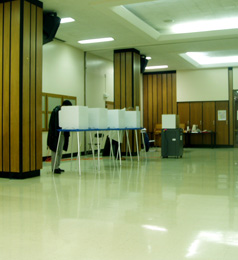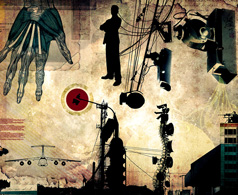 (Photo: Wikipedia.org)
(Photo: Wikipedia.org) Washington - Long before two conservative young activists strode into an ACORN office wearing a hidden camera, the grassroots organization had been racking up kills in its decades-long quest to protect working-class people from what it saw as wrongheaded corporate interests.
ACORN - the Association of Community Organizations for Reform Now - was founded in 1970 by a 21-year-old organizer who wanted to try a new way of lifting up low- and moderate-income workers.
It grew over the years, mushrooming from a one-man operation in Arkansas to 400,000 members working in 105 cities - the largest community organizing group in the nation.
According to Republican investigators and a top ACORN official, the group has received some $53 million in federal funding since 1994. Other funding comes from members' dues and foundations.
Along the way, activists helped pass state laws requiring living wages from companies contracting with state and local governments, and raising minimum wages. They helped monitor banks and lenders on the illegal practice of steering minorities into certain neighborhoods. They forged deals with corporations such as H&R Block to protect low-income earners. And they called attention to the rising scandal of subprime lending and the foreclosures that followed.
The non-partisan group also has helped register 1.7 million voters since 2004, many of them African-Americans and Hispanics in urban neighborhoods who were more likely to vote Democratic.
"(ACORN) has given a voice to people who would otherwise be politically powerless," said Peter Dreier , a professor of public policy at Occidental College in Los Angeles who has written about ACORN's work. "And it's rubbed the powerful forces in American society - particularly the Republican Party and big business - the wrong way."
In recent years, the organization also found itself accused of voter registration fraud after some of its canvassers turned in fake names to election offices in some states. And last year, the organization's board pushed out its founder, Wade Rathke , after learning that he had concealed for eight years the embezzlement of nearly $1 million by his brother.
Internal ACORN notes obtained by Republican investigators found some of the agency's top leadership worried about news coverage and angry at the actions of Rathke.
"Leadership has no faith in staff," read the minutes of an August 2008 meeting. "Wade betrayed them."
Rep. Darrell Issa , a California Republican, used the minutes as part of an 88-page report in July outlining what he called questionable - even criminal - practices by the group.
The GOP staff of the House Committee on Oversight and Government Reform , of which Issa is the top Republican, accused the organization of evading taxes, obstructing justice and improperly engaging in partisan political activities.
Weeks after the Republican House report, two undercover conservative activists began visiting ACORN offices across the country posing as a prostitute and her pimp.
In many of the offices, ACORN workers kicked the couple out and called police. But hidden-camera videos released earlier this month show ACORN workers at a handful of offices offering tax advice that appeared to encourage illegal activity.
Washington lawmakers reacted with fury, pushing to deny ACORN the right to receive much of its federal funding in separate votes last week in the House and Senate .
President Barack Obama's spokesman called the video's findings "completely unacceptable." ACORN fired the offending employees and ordered a halt to all new customers at its offices.
Conservative commentator Glenn Beck urged listeners to call their local newspapers and demand that the ACORN stories be put on the front page. Republican lawmakers lambasted the group as corrupt.
"Every day we continue to allow ACORN access to federal funding is another opportunity for this troubled organization to misuse and abuse taxpayer dollars," said House Minority Leader John Boehner .
Rep. David Price , a North Carolina Democrat, said the group bears watching.
"I want to see ACORN police itself; I want to see the federal government police ACORN," said Price, who was one of 75 House members voting against a motion to strip federal funding because of what he considered partisan posturing.
"It may well be there will be serious cutbacks on direct or indirect contract work that ACORN does," Price said.
The massive community group never was launched as a national effort.
It was founded in Little Rock, Ark. , in 1970 by Wade Rathke , who had previously worked as an organizer in Massachusetts .
"We were going to work very locally," Rathke recalled Friday in an interview. "I'd hoped that I could build an organizing model. I knew the chances of failure were huge."
Within a few years, the group expanded to South Dakota , then Texas and other states, 28 in all.
Robert Fisher , a professor of community organization at the University of Connecticut , said ACORN and its budget grew significantly during the second Bush administration as society became more stratified.
"ACORN was being a force for progressive change," said Fisher, editor of an upcoming book, "The People Shall Rule: ACORN, Community Organizing, and the Struggle for Economic Justice," due out next month from Vanderbilt University Press .
ACORN succeeded in part, he said, because it worked as a blend of local activists backed by a national structure.
"In their campaign against H&R Block , they were able to hold demonstrations at Block offices at 55 different sites around the nation simultaneously, so they could get the attention of a Fortune 500 company," Fisher said.
The group saw itself as both radical and practical.
When H&R Block began allegedly over-charging poor workers to help them get their Earned Income Tax Credit, ACORN picketed the group, but also encouraged state attorneys general to take action.
Eventually, ACORN and the company signed a deal to settle their differences and work together to educate low-income earners.
In one high-profile protest, a group of activists in Oakland, Calif. , padlocked themselves to a house being foreclosed on earlier this year, working on behalf of a homeowner who was a victim of a "rip-off loan," said Dreier of Occidental .
The group has worked within the mainstream political and economic system as well. Last summer, ACORN chief executive officer Bertha Lewis appeared with big-city mayors at a Washington press conference to tout mandatory settlement conferences between lenders and borrowers prior to foreclosure sales.
Around the country, workers at ACORN offices offer tax advice, loan counseling and housing assistance in low-income neighborhoods - some of it with federal funds.
In 2007, the group received $1.9 million from the Department of Housing and Urban Development for housing counseling, resident support services and Section 8 housing assistance, according to the database FedSpending.org.
ACORN officials say their impact has been significant.
An independent study done on behalf of ACORN found that the organization had brought monetary benefits worth $15.2 billion from 1994 to 2004 to moderate-income families through its work.
"Our mission is to help communities get more of a voice to better their lives, be it through better housing, decent schools or better neighborhoods," said Brian Kettenring , ACORN's deputy director of national operations.
But in recent years, the organization faced difficulties as it grew, say some observers.
"All of a sudden they had this infusion of money," Fisher said. "They became much more of a national force. ... They needed to become more formalized and more careful about what was going on, and they made errors."
According to the GOP investigation of ACORN, an outside legal firm warned the agency in 2008 that it could be improperly co-mingling financial accounts.
Meanwhile, local district attorneys in several states charged some ACORN workers with voter registration fraud. In one highly publicized case, forms were filled out with such names as Mickey Mouse and Donald Duck .
Dreier said most of those cases were revealed after ACORN brought the fraudulent registrations to officials' attention.



























![statesecrets_standards.jpg [President Barack Obama's administration on Wednesday made it more difficult for the government to suppress information on security grounds, amid allegations the power was used to cover up Bush-era excess. Attorney General Eric Holder, pictured in August 2009, announced that from today he would personally review claims to state secrecy privilege, and vowed tougher standards would be put in place. (AFP/Getty Images/File/Win Mcnamee)]](http://www.commondreams.org/files/article_images/statesecrets_standards.jpg) President Barack Obama's administration on Wednesday made it more difficult for the government to suppress information on security grounds, amid allegations the power was used to cover up Bush-era excess. Attorney General Eric Holder, pictured in August 2009, announced that from today he would personally review claims to state secrecy privilege, and vowed tougher standards would be put in place.(AFP/Getty Images/File/Win Mcnamee)
President Barack Obama's administration on Wednesday made it more difficult for the government to suppress information on security grounds, amid allegations the power was used to cover up Bush-era excess. Attorney General Eric Holder, pictured in August 2009, announced that from today he would personally review claims to state secrecy privilege, and vowed tougher standards would be put in place.(AFP/Getty Images/File/Win Mcnamee)![patriotact_leahy.jpg [Senate Judiciary Committee Chairman Sen. Patrick Leahy, D-Vt., holds up a copy of National Security Investigations and Prosecutions, Wednesday, Sept. 23, 2009, on Capitol Hill in Washington during the committee's hearing on the reauthorization of the Patriot Act. (AP Photo/Pablo Martinez Monsivais)]](http://www.commondreams.org/files/article_images/patriotact_leahy.jpg) Senate Judiciary Committee Chairman Sen. Patrick Leahy, D-Vt., holds up a copy of National Security Investigations and Prosecutions, Wednesday, Sept. 23, 2009, on Capitol Hill in Washington during the committee's hearing on the reauthorization of the Patriot Act. (AP Photo/Pablo Martinez Monsivais)
Senate Judiciary Committee Chairman Sen. Patrick Leahy, D-Vt., holds up a copy of National Security Investigations and Prosecutions, Wednesday, Sept. 23, 2009, on Capitol Hill in Washington during the committee's hearing on the reauthorization of the Patriot Act. (AP Photo/Pablo Martinez Monsivais)![barneyfrank_vanilla.jpg [Barney Frank (D-MA) chairman of the House Financial Services Committee waits for President Barack Obama to speak about the global financial crisis at Federal Hall in New York, September 14, 2009. (REUTERS/Jeff Zelevansky)]](http://www.commondreams.org/files/article_images/barneyfrank_vanilla_0.jpg) Barney Frank (D-MA) chairman of the House Financial Services Committee waits for President Barack Obama to speak about the global financial crisis at Federal Hall in New York, September 14, 2009. (REUTERS/Jeff Zelevansky)
Barney Frank (D-MA) chairman of the House Financial Services Committee waits for President Barack Obama to speak about the global financial crisis at Federal Hall in New York, September 14, 2009. (REUTERS/Jeff Zelevansky)







